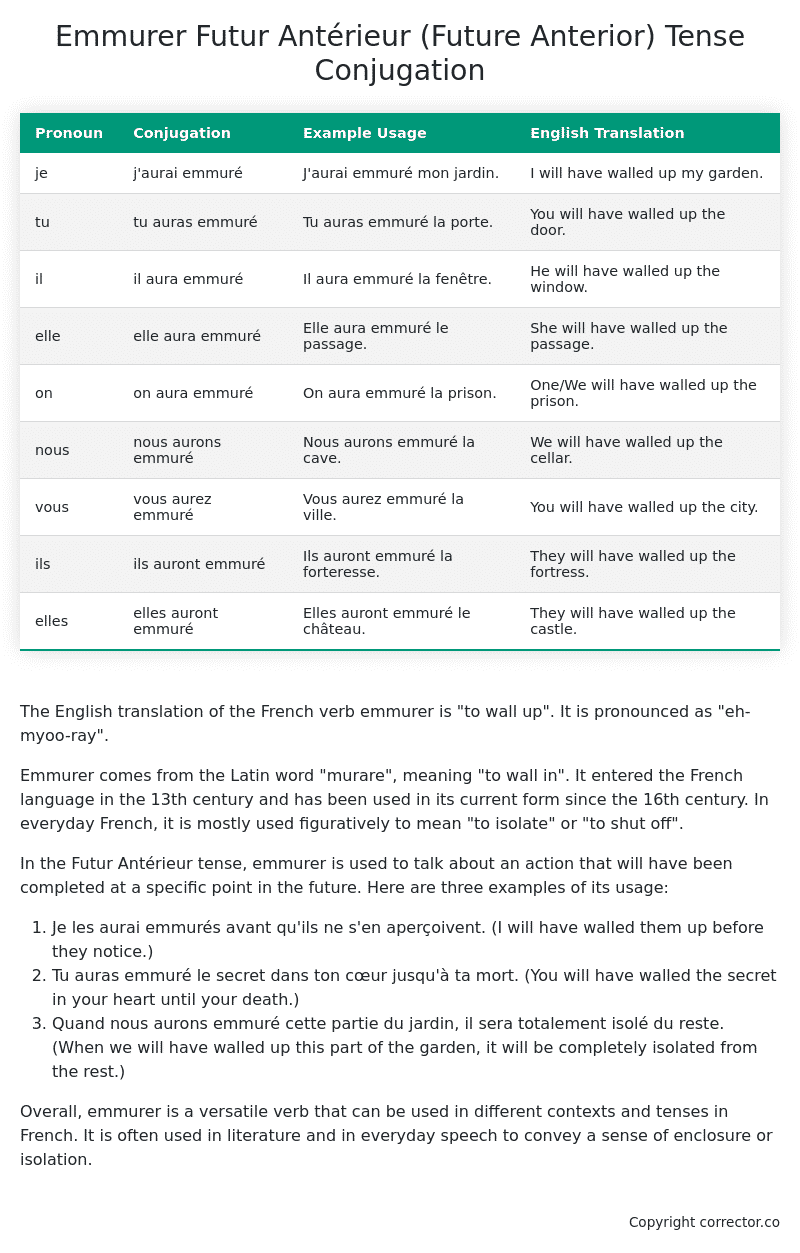Futur Antérieur (Future Anterior) Tense Conjugation of the French Verb emmurer
Introduction to the verb emmurer
The English translation of the French verb emmurer is “to wall up”. It is pronounced as “eh-myoo-ray”.
Emmurer comes from the Latin word “murare”, meaning “to wall in”. It entered the French language in the 13th century and has been used in its current form since the 16th century. In everyday French, it is mostly used figuratively to mean “to isolate” or “to shut off”.
In the Futur Antérieur tense, emmurer is used to talk about an action that will have been completed at a specific point in the future. Here are three examples of its usage:
- Je les aurai emmurés avant qu’ils ne s’en aperçoivent. (I will have walled them up before they notice.)
- Tu auras emmuré le secret dans ton cœur jusqu’à ta mort. (You will have walled the secret in your heart until your death.)
- Quand nous aurons emmuré cette partie du jardin, il sera totalement isolé du reste. (When we will have walled up this part of the garden, it will be completely isolated from the rest.)
Overall, emmurer is a versatile verb that can be used in different contexts and tenses in French. It is often used in literature and in everyday speech to convey a sense of enclosure or isolation.
Table of the Futur Antérieur (Future Anterior) Tense Conjugation of emmurer
| Pronoun | Conjugation | Example Usage | English Translation |
|---|---|---|---|
| je | j’aurai emmuré | J’aurai emmuré mon jardin. | I will have walled up my garden. |
| tu | tu auras emmuré | Tu auras emmuré la porte. | You will have walled up the door. |
| il | il aura emmuré | Il aura emmuré la fenêtre. | He will have walled up the window. |
| elle | elle aura emmuré | Elle aura emmuré le passage. | She will have walled up the passage. |
| on | on aura emmuré | On aura emmuré la prison. | One/We will have walled up the prison. |
| nous | nous aurons emmuré | Nous aurons emmuré la cave. | We will have walled up the cellar. |
| vous | vous aurez emmuré | Vous aurez emmuré la ville. | You will have walled up the city. |
| ils | ils auront emmuré | Ils auront emmuré la forteresse. | They will have walled up the fortress. |
| elles | elles auront emmuré | Elles auront emmuré le château. | They will have walled up the castle. |
Other Conjugations for Emmurer.
Le Present (Present Tense) Conjugation of the French Verb emmurer
Imparfait (Imperfect) Tense Conjugation of the French Verb emmurer
Passé Simple (Simple Past) Tense Conjugation of the French Verb emmurer
Passé Composé (Present Perfect) Tense Conjugation of the French Verb emmurer
Futur Simple (Simple Future) Tense Conjugation of the French Verb emmurer
Futur Proche (Near Future) Tense Conjugation of the French Verb emmurer
Plus-que-parfait (Pluperfect) Tense Conjugation of the French Verb emmurer
Passé Antérieur (Past Anterior) Tense Conjugation of the French Verb emmurer
Futur Antérieur (Future Anterior) Tense Conjugation of the French Verb emmurer (this article)
Subjonctif Présent (Subjunctive Present) Tense Conjugation of the French Verb emmurer
Subjonctif Passé (Subjunctive Past) Tense Conjugation of the French Verb emmurer
Subjonctif Imparfait (Subjunctive Imperfect) Tense Conjugation of the French Verb emmurer
Subjonctif Plus-que-parfait (Subjunctive Pluperfect) Tense Conjugation of the French Verb emmurer
Conditionnel Présent (Conditional Present) Tense Conjugation of the French Verb emmurer
Conditionnel Passé (Conditional Past) Tense Conjugation of the French Verb emmurer
L’impératif Présent (Imperative Present) Tense Conjugation of the French Verb emmurer
L’infinitif Présent (Infinitive Present) Tense Conjugation of the French Verb emmurer
Struggling with French verbs or the language in general? Why not use our free French Grammar Checker – no registration required!
Get a FREE Download Study Sheet of this Conjugation 🔥
Simply right click the image below, click “save image” and get your free reference for the emmurer Futur Antérieur tense conjugation!

Emmurer – About the French Futur Antérieur (Future Anterior) Tense
Construction
Common Everyday Usage Patterns
Interactions with Other Tenses
For example
Summary
I hope you enjoyed this article on the verb emmurer. Still in a learning mood? Check out another TOTALLY random French verb conjugation!


